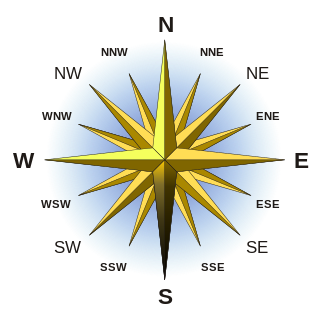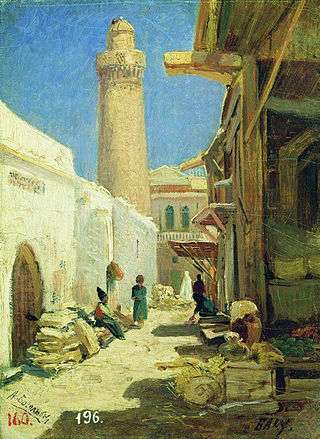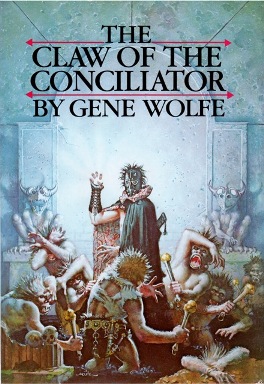
The tropics are the regions of Earth surrounding the Equator, where the sun may shine directly overhead. This contrasts with the temperate or polar regions of Earth, where the Sun can never be directly overhead. This is because of Earth's axial tilt; the width of the tropics is twice the tilt. The tropics are also referred to as the tropical zone and the torrid zone.

South is one of the cardinal directions or compass points. The direction is the opposite of north and is perpendicular to both west and east.
In the dystopian novel Nineteen Eighty-Four, thoughtcrime is the offense of thinking in ways not approved by the ruling Ingsoc party. In the official language of Newspeak, the word crimethink describes the intellectual actions of a person who entertains and holds politically unacceptable thoughts; thus the government of The Party controls the speech, the actions, and the thoughts of the citizens of Oceania.

Gene Rodman Wolfe was an American science fiction and fantasy writer. He was noted for his dense, allusive prose as well as the strong influence of his Catholic faith. He was a prolific short story writer and novelist, and won many literary awards. Wolfe has been called "the Melville of science fiction", and was honored as a Grand Master by the Science Fiction and Fantasy Writers of America.

Noon is 12 o'clock in the daytime. It is written as 12 noon, 12:00 m., 12 p.m., 12 pm, or 12:00 or 1200 . Solar noon is the time when the Sun appears to contact the local celestial meridian. This is when the Sun reaches its apparent highest point in the sky, at 12 noon apparent solar time and can be observed using a sundial. The local or clock time of solar noon depends on the date, longitude, and time zone, with Daylight Saving Time tending to place solar noon closer to 1:00pm.

A shadow is a dark area where light from a light source is blocked by an object. It occupies all of the three-dimensional volume behind an object with light in front of it. The cross section of a shadow is a two-dimensional silhouette, or a reverse projection of the object blocking the light.

The Book of the New Sun is a four-volume science fantasy novel written by the American author Gene Wolfe. The work is in four parts with a fifth novel acting as a coda to the main story. It inaugurated the "Solar Cycle" that Wolfe continued by setting other works in the same universe.

The Shadow of the Torturer is a science fantasy novel by American writer Gene Wolfe, published by Simon & Schuster in May 1980. It is the first of four volumes in The Book of the New Sun which Wolfe had completed in draft before The Shadow of the Torturer was published. It relates the story of Severian, an apprentice Seeker for Truth and Penitence, from his youth through his expulsion from the guild and subsequent journey out of his home city of Nessus.

The Claw of the Conciliator is a science fantasy novel by American writer Gene Wolfe, first released in 1981. It is the second volume in the four-volume series The Book of the New Sun.

The Citadel of the Autarch is a science fantasy novel by American writer Gene Wolfe, first released in 1983. It is the fourth and final volume in the four-volume series The Book of the New Sun.

The Castle of the Otter is a collection of essays and other non-fiction by Gene Wolfe, related to his Book of the New Sun tetralogy. It takes its title from an incorrect announcement of Wolfe's final volume in Locus. The Citadel of the Autarch was the actual name of the final work in the series. Wolfe liked the inaccurate title, though, and reused it as the name for a companion work of non-fiction essays and unused materials from the series.
Severian is the narrator and main character of Gene Wolfe's four-volume science fiction series The Book of the New Sun, as well as its sequel, The Urth of the New Sun. He is a Journeyman of the Seekers for Truth and Penitence who is exiled after showing mercy to one of his clients.

The Urth of the New Sun is a 1987 science fiction novel by Gene Wolfe that serves as a coda to his four-volume Book of the New Sun series. Like Book of the New Sun, it is of the Dying Earth subgenre. It was nominated for the Hugo Award for Best Novel, Locus Award for Best Science Fiction Novel and the Nebula Award for Best Novel in 1988.

Daytime or day as observed on Earth is the period of the day during which a given location experiences natural illumination from direct sunlight. Daytime occurs when the Sun appears above the local horizon, that is, anywhere on the globe's hemisphere facing the Sun. In direct sunlight the movement of the sun can be recorded and observed using a sundial that casts a shadow that slowly moves during the day. Other planets and natural satellites that rotate relative to a luminous primary body, such as a local star, also experience daytime, but this article primarily discusses daytime on Earth.
Sol Stein was the author of 13 books and was Publisher and Editor-in-Chief of Stein and Day Publishers for 27 years.

Sun path, sometimes also called day arc, refers to the daily and seasonal arc-like path that the Sun appears to follow across the sky as the Earth rotates and orbits the Sun. The Sun's path affects the length of daytime experienced and amount of daylight received along a certain latitude during a given season.
In the dystopian novel Nineteen Eighty-Four (1984), by George Orwell, Newspeak is the fictional language of Oceania, a totalitarian superstate. To meet the ideological requirements of Ingsoc in Oceania, the Party created Newspeak, which is a controlled language of simplified grammar and limited vocabulary designed to limit a person's ability for critical thinking. The Newspeak language thus limits the person's ability to articulate and communicate abstract concepts, such as personal identity, self-expression, and free will, which are thoughtcrimes, acts of personal independence that contradict the ideological orthodoxy of Ingsoc collectivism.

Lāhainā Noon, also known as a zero shadow day, is a semi-annual tropical solar phenomenon when the Sun culminates at the zenith at solar noon, passing directly overhead. As a result, the sun's rays will fall exactly vertical relative to an object on the ground and cast no observable shadow. When this occurs at a given location, the location is Earth's subsolar point. A zero shadow day occurs twice a year for locations in the tropics when the Sun's declination becomes equal to the latitude of the location, so that the date varies by location. The term "Lāhainā Noon" was initiated by the Bishop Museum in Hawaiʻi.
An experimental language is a constructed language designed for linguistics research, often on the relationship between language and thought.













